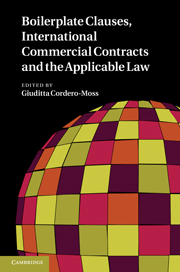Book contents
- Frontmatter
- Contents
- List of contributors
- Preface
- Introduction
- PART 1 How contracts are written in practice
- PART 2 Methodological challenges
- PART 3 The applicable law's effects on boilerplate clauses
- Introduction to Part 3
- 7 The common law tradition: application of boilerplate clauses under English law
- 8 The Germanic tradition: application of boilerplate clauses under German law
- 9 The Romanistic tradition: application of boilerplate clauses under French law
- 10 The Romanistic tradition: application of boilerplate clauses under Italian law
- 11 The Nordic tradition: application of boilerplate clauses under Danish law
- 12 The Nordic tradition: application of boilerplate clauses under Finnish Law
- 13 The Nordic tradition: application of boilerplate clauses under Norwegian law
- 14 The Nordic tradition: application of boilerplate clauses under Swedish law
- 15 The East European tradition: application of boilerplate clauses under Hungarian law
- 16 The East European tradition: application of boilerplate clauses under Russian law
- Conclusion: the self-sufficient contract, uniformly interpreted on the basis of its own terms: an illusion, but not fully useless
- Bibliography
- Index
10 - The Romanistic tradition: application of boilerplate clauses under Italian law
from PART 3 - The applicable law's effects on boilerplate clauses
Published online by Cambridge University Press: 11 April 2011
- Frontmatter
- Contents
- List of contributors
- Preface
- Introduction
- PART 1 How contracts are written in practice
- PART 2 Methodological challenges
- PART 3 The applicable law's effects on boilerplate clauses
- Introduction to Part 3
- 7 The common law tradition: application of boilerplate clauses under English law
- 8 The Germanic tradition: application of boilerplate clauses under German law
- 9 The Romanistic tradition: application of boilerplate clauses under French law
- 10 The Romanistic tradition: application of boilerplate clauses under Italian law
- 11 The Nordic tradition: application of boilerplate clauses under Danish law
- 12 The Nordic tradition: application of boilerplate clauses under Finnish Law
- 13 The Nordic tradition: application of boilerplate clauses under Norwegian law
- 14 The Nordic tradition: application of boilerplate clauses under Swedish law
- 15 The East European tradition: application of boilerplate clauses under Hungarian law
- 16 The East European tradition: application of boilerplate clauses under Russian law
- Conclusion: the self-sufficient contract, uniformly interpreted on the basis of its own terms: an illusion, but not fully useless
- Bibliography
- Index
Summary
Entire agreement clauses and no oral amendments clauses as clauses provided in alien contracts
Entire agreement clauses, also known as merger clauses as well as no oral amendments clauses, are not a usual part of traditional Italian contractual practice for two main reasons.
The first reason is that in traditional Italian practice, contracts, including those between companies, are usually short and the parties agree only on the main issues, leaving statutes to rule on the other issues: Article 1374 of the Italian Civil Code accordingly provides that ‘a contract binds the parties not only as to what is expressly provided, but also to all the consequences deriving from it by law or, in absence, according to usage and equity’ (emphasis added).
The second reason is that the problem of oral agreements made prior to or at the same time as the written agreement, or after the drawing of the document, is expressly covered by two articles of the Italian Civil Code. Article 2722 states that ‘proof by witnesses is not permitted to establish stipulations which have been added or are contrary to the contents of a document, and which are claimed to have been made prior to or at the same time as the document’, while Article 2723 states that ‘when it is alleged that, after the drawing of a document, a stipulation has been made, in addition or contrary to its contents, the judge can admit proof by witnesses only if, in consideration of the character of the parties, the nature of the contract, and any other circumstances, it appears likely that verbal additions or modifications have occurred’.
- Type
- Chapter
- Information
- Publisher: Cambridge University PressPrint publication year: 2011



